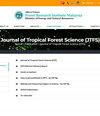PONGAMIA SEED: A POSSIBLE SOURCE OF GREEN ENERGY FOR POWER GENERATION
IF 0.8
4区 农林科学
Q4 FORESTRY
引用次数: 0
Abstract
Pongamia ( Pongamia pinnata ) is a prospective biofuel plant with 35 to 45% seed oil. The physical and chemical characteristics of pongamia oil are quite comparable to those of diesel. Pongamia seed oil has been considered as a possible biodiesel source for the past 10 years. The high viscosity and conradson carbon residue of pongamia oil, however, preclude its usage in this capacity. Thus, methyl ester was produced from pongamia oil by optimising the different parameters of transesterification reaction viz. , reaction time (90 minutes), amount of catalysist (1.5 wt.%), amount of methanol (210 ml per liter of oil) and optimum temperature (50 ° C) needed to complete the conversion of oil into methyl ester. The produced methyl ester was employed as fuel instead of diesel in the engine test using a single-cylinder, naturally aspirated, direct injection diesel engine. Parameters such engine speed, electrical efficiency, lower and higher heating values, and fuel consumption were investigated. Speed regulation and voltage regulation in the engine experiment provided clear evident that the biodiesel from pongamia oil could be used in an existing diesel engine without any engine modifications. The physical and chemical properties of the methyl ester were also estimated. The biodiesel produced from quality pongamia seed meets the cetane number (52.90) and iodine value (99) as per the biodiesel quality specifications and can be used in varied climatic conditions沙蚕籽:一种可能用于发电的绿色能源
本文章由计算机程序翻译,如有差异,请以英文原文为准。
求助全文
约1分钟内获得全文
求助全文
来源期刊
CiteScore
1.70
自引率
22.20%
发文量
61
审稿时长
3 months
期刊介绍:
The Journal of Tropical Forest Science (JTFS) is an international reviewed journal concerning the science, technology and development of tropical forests and forest products. The journal welcomes articles reporting original fundamental or applied research on tropical forest biology, ecology, chemistry, management, silviculture, conservation, utilization and product development. English is the official language of the journal. Only manuscripts with substantial scientific merit will be reviewed for originality, significance, relevance and quality.

 求助内容:
求助内容: 应助结果提醒方式:
应助结果提醒方式:


